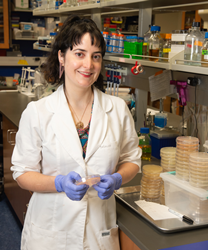
Susanne DiSalvo, PhD, assistant professor in the SIUE Department of Biological Sciences.
“This award is recognition of Dr. DiSalvo’s achievements, as well as NSF’s investment in her potential for advancing knowledge and education in her area of research.”
EDWARDSVILLE, Ill. (PRWEB)
May 14, 2021
Susanne DiSalvo, PhD, assistant professor in the Southern Illinois University Edwardsville College of Arts and Sciences’ Department of Biological Sciences, has received the highly competitive National Science Foundation (NSF) CAREER Award totaling $463,557.
The award supports her research entitled, “Population and evolutionary dynamics of bacteriophage-symbiont-host interactions: Development of a multi-layered model microbiome,” the findings of which will elucidate virus-host evolution and may inform alternative strategies for treating bacterial infections.
“I feel incredibly fortunate,” said DiSalvo. “This grant will fund a long-term project in my lab integrating bacteriophages (viruses of bacteria) into my research program which focuses on bacterial infections in an amoeba host system. Bacteriophages are highly ubiquitous in the environment and play a powerful role on bacterial prevalence and evolution. With the rise of antibiotic resistance, interest in using phages to treat bacterial infections has magnified, but their long-term efficacy and their potential to drive the evolution of their bacterial targets within a treated individual is not well understood. This project seeks to illuminate the dynamic outcomes of phage treatment in a tractable model system.”
“The CAREER grant is the NSF’s most prestigious award a faculty member can receive in their early career,” said Jerry Weinberg, PhD, associate provost for research and dean of the Graduate School. “This award is recognition of Dr. DiSalvo’s achievements, as well as NSF’s investment in her potential for advancing knowledge and education in her area of research.”
DiSalvo underscores the importance of publicly investing in science, the value of which has become obvious amid the COVID-19 pandemic.
“The fact that there are effective vaccines against Sars-Cov-2 within a year of its emergence is a product of decades of research in both basic and translational science,” she explained. “This would not have been possible without federally funded research and infrastructure. The current emphasis on supporting science makes me optimistic about our future, specifically for training future scientists who can go on to solve future challenges.”
Funding from the NSF CAREER Award will allow DiSalvo to train several students in hands-on inquiry-based research.
“I will be able to support graduate and undergraduate students in my research lab with these funds and integrate key research elements into my teaching courses – specifically microbiology and virology – allowing a large number of students to learn valuable scientific skills while directly contributing to novel discoveries,” DiSalvo said.
“A typical student project entails a mix of collaborative and independent work planning and conducting the experimental strategy and analyzing and interpreting results,” she added. “Students participate in a variety of microbial, molecular and computational work, as well as attend weekly lab meetings to discuss science literature, research progress, career goals and many other topics beyond research. There is a lot of camaraderie in the lab, and the students not only work hard on their own projects, but also readily help one another and make the lab a fun and friendly place to be.”
DiSalvo also earned the Graduate School’s 2020-21 Vaughnie Lindsay New Investigator Award. According to DiSalvo, the award was instrumental for progressing her project on the mechanisms underlying Paraburkholderia infections.
“Through this work, I was able to identify amoeba host genes that play an important role in mediating the infection process, and in specific, defending the host from high levels of infection,” she explained. “This discovery allows me to craft a hypothesis-driven strategy to uncover the mechanisms whereby host factors facilitate or inhibit bacterial infection efficacy.”
She plans to utilize these findings to develop a proposal for a future external grant submission.
By preparing the next generation of leaders in a knowledge-based economy, SIUE’s Graduate School fulfills the region’s demand for highly trained professionals. Graduate school offerings include arts and sciences, business, education, engineering, nursing, and interdisciplinary opportunities. SIUE professors provide students with a unique integration of theoretical education and hands-on research experiences. Students can obtain graduate certificates or pursue master’s degrees, and be part of a supportive learning and rich intellectual environment that is tailored to the needs of adult learners. The Graduate School raises the visibility of research and creative activity at SIUE, which ranks highest among its Illinois Board of Higher Education peers in total research and development expenditures, according to the National Science Foundation. Doctoral programs are available in nursing practice and educational leadership. Cooperative PhD programs in history, environmental resources and policy, engineering science, and computer science are offered with SIU Carbondale.
Share article on social media or email:

